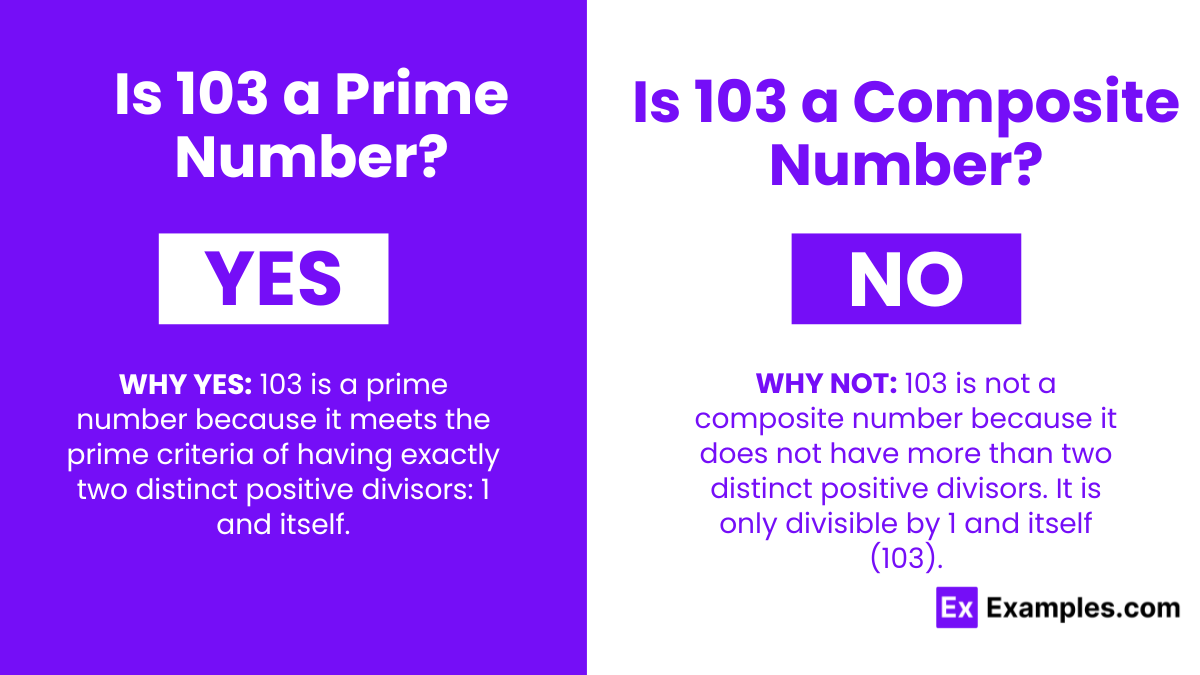Is 103 a prime number or a composite number?
Prime
Composite
Neither
Both

Why Yes: 103 is a prime number because it meets the prime criteria of having exactly two distinct positive divisors: 1 and itself. Check Prime or Not
Why No: 103 is not a composite number because it does not have more than two distinct positive divisors. It is only divisible by 1 and itself (103).
| Property | Answer |
|---|---|
| Is 103 a prime number? | Yes |
| Is 103 a composite number? | No |
| Is 103 a perfect square? | No |
| Factors of 103 | 1, 103 |
| Multiples of 103 | 103, 206, 309, 412, 515, 618, 721, 824, 927, 1030 |
| Cube Root of 103 | 4.687 |
| Square of 103 | 10609 |
| Square Root of 103 | 10.148 |
| Is 103 a Perfect Cube? | No |
| Is 103 an Irrational number | No |
| Is 103 a Rational number | Yes |
| Is 103 a Real number | Yes |
| Is 103 an Integer | Yes |
| Is 103 a Natural number | Yes |
| Is 103 a Whole number | Yes |
| Is 103 an Even or odd number | Yes (103 is an odd number) |
| Is 103 an Ordinal number | Yes |
| Is 103 a Complex number | Yes (as all real numbers are also complex numbers) |
The factors of 103 are 1 and 103. 103 is a prime number because it is only divisible by 1 and itself, demonstrating it has exactly two factors. This clarity confirms that it is a prime number, not a composite number.
103 is categorized as a prime number because it has exactly two distinct positive divisors: 1 and itself.
The nearest prime numbers to 103 are 101 and 107. 101 is the closest prime number less than 103, and 107 is the closest prime number greater than 103.
Text prompt
Add Tone
10 Examples of Public speaking
20 Examples of Gas lighting
Is 103 a prime number or a composite number?
Prime
Composite
Neither
Both
What is the classification of the number 103?
Prime
Composite
Neither
Both
The number 103 is best described as which of the following?
Composite
Prime
Both
Neither
Is 103 a composite number?
Yes
No
Maybe
Can't determine
How can 103 be classified?
As a prime number because it has only two divisors.
As a composite number because it has more than two divisors.
As neither prime nor composite.
As both prime and composite.
What is the correct classification of the number 103?
Composite
Prime
Neither
Both
Which of the following statements about 103 is true?
It is a composite number because it can be divided evenly by numbers other than 1 and 103.
It is a prime number because it has no divisors other than 1 and 103
It is both a prime and composite number.
It is neither prime nor composite.
Is 103 a prime number based on its divisors?
Yes, because it has exactly two distinct divisors.
No, because it has more than two divisors.
Yes, because it is an even number.
No, because it is an odd number.
What makes 103 a prime number?
It is divisible by 1 and itself only.
It has multiple divisors.
It is an even number.
It is divisible by 2.
Can 103 be classified as composite?
No, because it is divisible by 2.
Yes, because it has multiple divisors.
No, because it has no divisors other than 1 and itself.
Yes, because it is divisible by 3.
Before you leave, take our quick quiz to enhance your learning!

